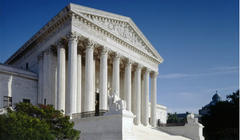 The Supreme Court ruled today that an adopted Native American girl does not have to be returned to her biological father in accordance with the 1978 Indian Child Welfare Act.
The Supreme Court ruled today that an adopted Native American girl does not have to be returned to her biological father in accordance with the 1978 Indian Child Welfare Act.The court was divided over the case and returned authority to South Carolina state courts for the ultimate verdict. The decision was made via a 5-4 vote.
The Indian Child Welfare Act is designed to prevent Native American children from being taken from their homes and placed in homes with non-Native American adoptive parents. Several factors made this case so difficult for justices to decide on.
The child involved is three years old, and only 1% Native American. Her small amount of Native American heritage comes from her father’s side. When the child’s biological mother became pregnant, the father relinquished his parental rights over the child. He was not involved with the mother during her pregnancy and paid no child support.
When the child was born, the biological mother gave her up for adoption. Charleston, South Carolina couple Matt and Melanie Capobianco were present at the child’s birth and immediately took her into their home. The girl remained in their custody for two years until the girl’s biological father, Dusten Brown, came back into the picture. Brown is a member of Cherokee Nation and decided that he wanted custody of his daughter. The Indian Child Welfare Act (ICWA) gave Brown legal rights to his daughter, who said he wanted the child to grow up with him and learn Cherokee tribal traditions.
The state of South Carolina ruled in favor of Brown, and the girl was taken from her adoptive parents and returned to her father’s custody. But the adoptive parents were not about to give up their adopted daughter without a fight. The couple appealed the state’s decision and took it all the way to the Supreme Court.
Supreme Court justices ruled against the ICWA because of one crucial factor: the biological Father relinquished his parental rights before the child was born, and never had been involved in the girl’s life. The ICWA is designed to keep Native American together, but the biological Father had never been involved with the girl as a family member in the first place. The ICWA is only designed to protect the parental rights that the father had already relinquished. The law is needed because Social Services had a history of deeming poor Native American parents as “unfit” and taking their children from them. This case is clearly different from what the law was designed for.
Here’s how Supreme Court Justice Samuel Alito explained the majorities ruling:
“The Act would put certain vulnerable children at a great disadvantage solely because an ancestor — even a remote one — was an Indian,” Alito said. “A biological Indian father could abandon his child in utero and refuse any support for the birth mother — perhaps contributing to the mother’s decision to put the child up for adoption — and then could play his ICWA trump card at the eleventh hour to override the mother’s decision and the child’s best interest. If this were possible, many prospective adoptive parents would surely pause before adopting any child who might possibly qualify as an Indian under the ICWA.”
Four justices disagree with the majority’s interpretation of the law, including Justices Sonia Sotomayor, Antonin Scalia, Ruth Ginsburg, and Elena Kagan. The justices say the ICWA gives the father custody of his daughter since he now wishes to raise her.
Justice Sotomayor accused the majority of reading the ICWA “upside down, reading it from bottom to top in order to reach a conclusion that is manifestly contrary to Congress’ express purpose in enacting ICWA.”
Children’s rights groups are split over the decision as well. Megan Lindsey, director of public policy and education for the National Council for Adoption, calls the ruling a “wonderful victory for children and adoption.” On the other hand, Mary Lee Allen, director of child welfare and mental health for the Children’s Defense Fund says the ruling “threatens to undermine the values and practices that have become central to effective child welfare practice.”
Many expect South Carolina courts to allow the biological father to retain custody of the child. The state courts already ruled him a fit and deserving parent once, and the Supreme Court’s closely split decision doesn’t appear to invalidate that ruling.
(USA Today, Washington Post, Huffington Post) Reported by Opposing Views 18 hours ago.